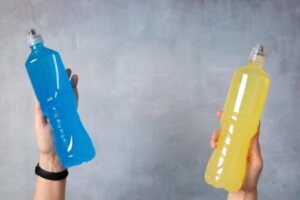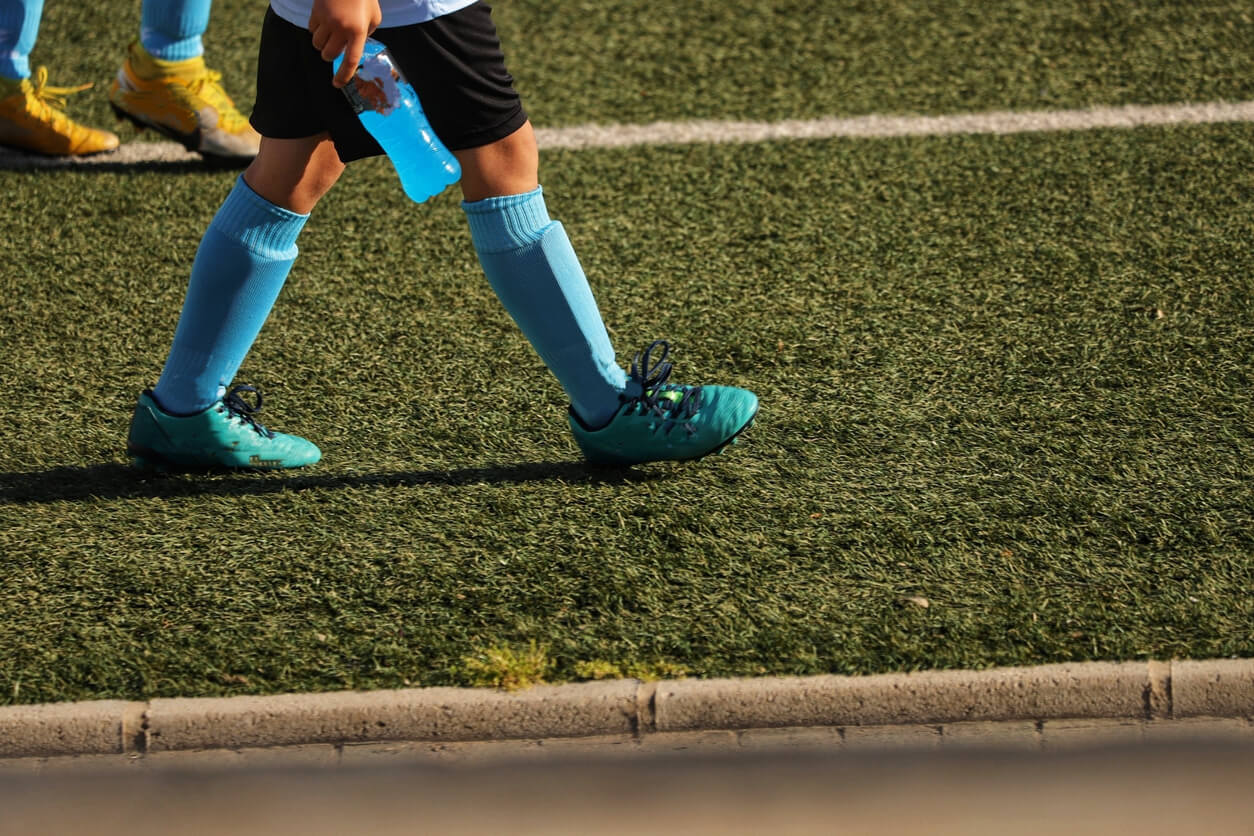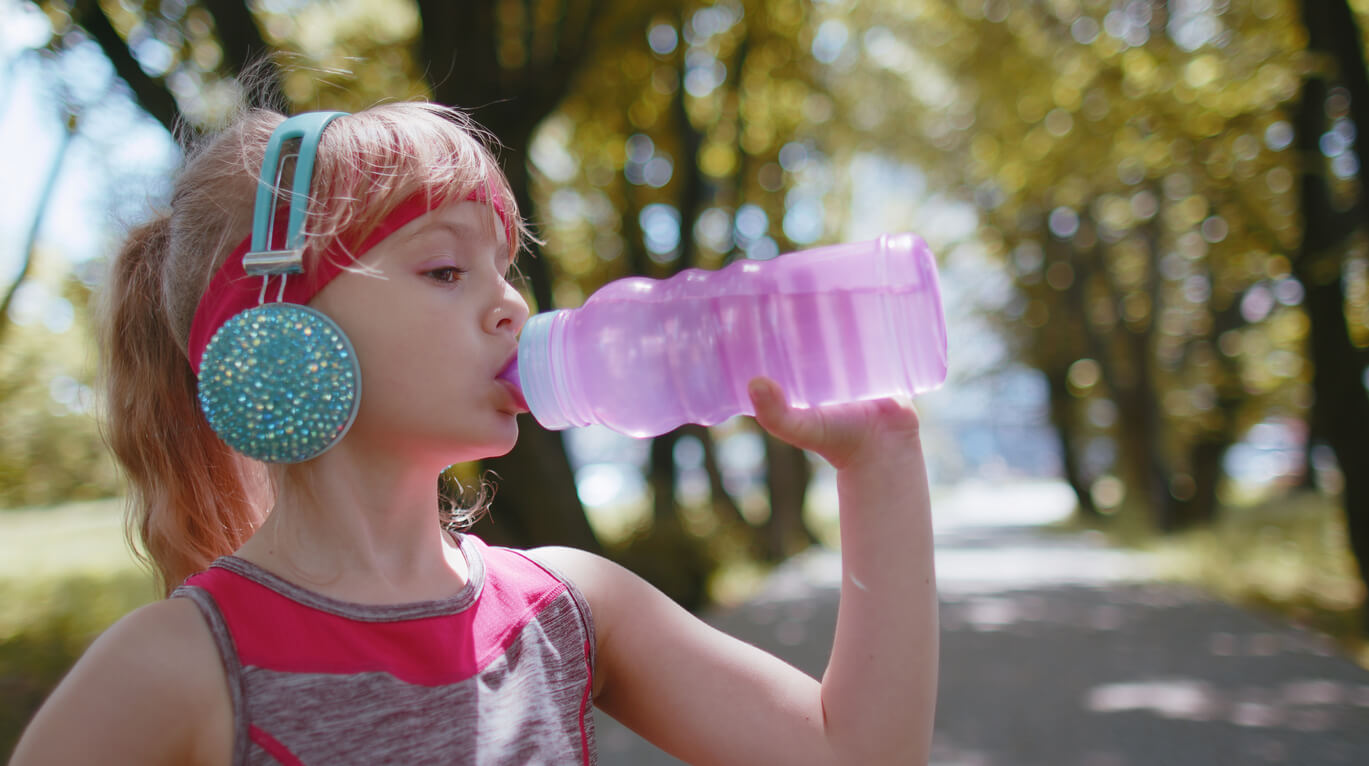How Sports Drinks Can Damage Your Child's Teeth


Written and verified by the dentist Vanesa Evangelina Buffa
When children regularly practice some physical activity, it’s common for parents to offer them some special liquid to recover their energy. But giving sports drinks to children can damage their teeth, due to their high sugar content and acidity. In this article, we’ll tell you about it in detail.
Sports drinks and what they contain
During and after sports practices, athletes need to stay hydrated to continue their activities in a healthy way. Sports drinks are a product created for this purpose, as they contain ingredients that help replenish water and electrolytes. For this reason, it’s common for parents to offer this type of liquid to their children when they’re physically active.
Components
Among their components, sports drinks contain carbohydrates, mineral salts, water, citric acid, additives, and high levels of sugar. This large amount of available glucose is what allows athletes to have the energy they need immediately. However, frequent consumption can have negative health consequences.
The high sugar content of these products is associated with obesity problems and metabolic disorders such as diabetes. In addition, they can also damage teeth. In this regard, it’s important to point out that the sugar content of these liquids far exceeds the maximum amount recommended for children, although this information isn’t always included on the labels.
Due to the influence of advertising and the sponsorship of sporting events, these beverages are often associated with a healthy lifestyle. On the contrary, you should know that they’re not necessary for children, as they can affect them adversely due to the fact that they weigh less than adults. Therefore, they experience greater exposure to stimulant ingredients in relation to their weight.

How sports drinks can damage your children’s teeth
Excess sugars are mainly responsible for the negative effects of sports drinks on the oral cavity. This sweet content favors the proliferation of bacteria in the mouth and increases the risk of developing diseases such as cavities and gingivitis. By metabolizing simple carbohydrates, germs produce acids that lower the pH of the mouth and are capable of demineralizing tooth surfaces.
The proliferation and accumulation of bacteria are also capable of irritating the gums, causing them to become inflamed, leading to gingivitis. But sugar is not the only culprit for the negative effects of sports drinks on teeth. Also, these liquids are acidic, so their ingestion lowers the pH of the mouth and increases the destruction of teeth.
The acidity of these drinks is associated with tooth erosion, which is the loss of minerals from the surface of the teeth due to the action of acids. This lack of substance in the teeth can lead to dental hypersensitivity and favor the development of cavities. It’s important to keep in mind that tooth enamel is a non-recoverable body tissue. Therefore, if you offer sports drinks to your children, the damage to their teeth is irreversible.
How to prevent tooth damage from sports drinks
Sports and energy drinks aren’t recommended for children and adolescents. These types of hydrators are intended for high-performance adult athletes. Sports drinks may seem healthy, but they contain extra calories that children don’t need and increase the risk of health problems.
For children who are routinely physically active, water’s the best form of hydration. Another option is to look for nutritious and healthy alternatives to combine. For example, coconut water, unsweetened chocolate milk, and bananas are excellent substitutes. If you still prefer to offer sports drinks to your children, there are a few tips to consider to minimize mouth damage:
- Avoid having them drink sports drinks over time. It’s better to have them drink all the liquid at once and then let their body compensate for the oral acidity than to have them do it over and over again over the course of an hour, for example. Drinking on and off keeps the pH of your mouth acidic for long periods of time.
- Limit sports drinks to when your child is physically active. Avoid excessive consumption at any time of the day.
- Use a straw to reduce the contact of the drink with tooth surfaces.
- Opt for sports drinks that are low in sugar and low in acid. It’s important to read product labels before giving them to children.
- Alternate sports drinks with water to rinse the mouth.
- Offer sugar-free chewing gum to keep teeth healthy.

Act with awareness
Sometimes, misleading advertisements can lead us to choose foods that appear to be good but aren’t. Sports drinks, although they may seem beneficial for children who exercise, can damage their teeth and increase the risk of other, even more serious, problems. That’s why being informed about which products are better for health is the best way to accompany your little one when they play sports.
It’s always better to choose simple options, such as water and fruits, rather than industrial products that contain harmful ingredients. Finally, if you offer a sports drink to your child after a workout or a competition, it won’t be a big threat. The important thing is that you limit its quantity and frequency and keep in mind the above recommendations.
When children regularly practice some physical activity, it’s common for parents to offer them some special liquid to recover their energy. But giving sports drinks to children can damage their teeth, due to their high sugar content and acidity. In this article, we’ll tell you about it in detail.
Sports drinks and what they contain
During and after sports practices, athletes need to stay hydrated to continue their activities in a healthy way. Sports drinks are a product created for this purpose, as they contain ingredients that help replenish water and electrolytes. For this reason, it’s common for parents to offer this type of liquid to their children when they’re physically active.
Components
Among their components, sports drinks contain carbohydrates, mineral salts, water, citric acid, additives, and high levels of sugar. This large amount of available glucose is what allows athletes to have the energy they need immediately. However, frequent consumption can have negative health consequences.
The high sugar content of these products is associated with obesity problems and metabolic disorders such as diabetes. In addition, they can also damage teeth. In this regard, it’s important to point out that the sugar content of these liquids far exceeds the maximum amount recommended for children, although this information isn’t always included on the labels.
Due to the influence of advertising and the sponsorship of sporting events, these beverages are often associated with a healthy lifestyle. On the contrary, you should know that they’re not necessary for children, as they can affect them adversely due to the fact that they weigh less than adults. Therefore, they experience greater exposure to stimulant ingredients in relation to their weight.

How sports drinks can damage your children’s teeth
Excess sugars are mainly responsible for the negative effects of sports drinks on the oral cavity. This sweet content favors the proliferation of bacteria in the mouth and increases the risk of developing diseases such as cavities and gingivitis. By metabolizing simple carbohydrates, germs produce acids that lower the pH of the mouth and are capable of demineralizing tooth surfaces.
The proliferation and accumulation of bacteria are also capable of irritating the gums, causing them to become inflamed, leading to gingivitis. But sugar is not the only culprit for the negative effects of sports drinks on teeth. Also, these liquids are acidic, so their ingestion lowers the pH of the mouth and increases the destruction of teeth.
The acidity of these drinks is associated with tooth erosion, which is the loss of minerals from the surface of the teeth due to the action of acids. This lack of substance in the teeth can lead to dental hypersensitivity and favor the development of cavities. It’s important to keep in mind that tooth enamel is a non-recoverable body tissue. Therefore, if you offer sports drinks to your children, the damage to their teeth is irreversible.
How to prevent tooth damage from sports drinks
Sports and energy drinks aren’t recommended for children and adolescents. These types of hydrators are intended for high-performance adult athletes. Sports drinks may seem healthy, but they contain extra calories that children don’t need and increase the risk of health problems.
For children who are routinely physically active, water’s the best form of hydration. Another option is to look for nutritious and healthy alternatives to combine. For example, coconut water, unsweetened chocolate milk, and bananas are excellent substitutes. If you still prefer to offer sports drinks to your children, there are a few tips to consider to minimize mouth damage:
- Avoid having them drink sports drinks over time. It’s better to have them drink all the liquid at once and then let their body compensate for the oral acidity than to have them do it over and over again over the course of an hour, for example. Drinking on and off keeps the pH of your mouth acidic for long periods of time.
- Limit sports drinks to when your child is physically active. Avoid excessive consumption at any time of the day.
- Use a straw to reduce the contact of the drink with tooth surfaces.
- Opt for sports drinks that are low in sugar and low in acid. It’s important to read product labels before giving them to children.
- Alternate sports drinks with water to rinse the mouth.
- Offer sugar-free chewing gum to keep teeth healthy.

Act with awareness
Sometimes, misleading advertisements can lead us to choose foods that appear to be good but aren’t. Sports drinks, although they may seem beneficial for children who exercise, can damage their teeth and increase the risk of other, even more serious, problems. That’s why being informed about which products are better for health is the best way to accompany your little one when they play sports.
It’s always better to choose simple options, such as water and fruits, rather than industrial products that contain harmful ingredients. Finally, if you offer a sports drink to your child after a workout or a competition, it won’t be a big threat. The important thing is that you limit its quantity and frequency and keep in mind the above recommendations.
All cited sources were thoroughly reviewed by our team to ensure their quality, reliability, currency, and validity. The bibliography of this article was considered reliable and of academic or scientific accuracy.
- Alsunni, A. A. (2015). Energy drink consumption: beneficial and adverse health effects. International journal of health sciences, 9(4), 468.
- Cañadulce, L. E. G., Alba, O. L. P., & Albarracín, D. G. E. (2019). El comportamiento de las bebidas energéticas un problema de salud pública en estudiantes de entrenamiento deportivo. RED: Revista de entrenamiento deportivo= Journal of Sports Training, 33(1), 17-35.
- Chan, A. S., Tran, T. T. K., Hsu, Y. H., Liu, S. Y. S., & Kroon, J. (2020). A systematic review of dietary acids and habits on dental erosion in adolescents. International journal of paediatric dentistry, 30(6), 713-733.
- Chatterjee, A., & Abraham, J. (2019). A comprehensive study on sports and energy drinks. In Sports and energy drinks (pp. 515-537). Woodhead Publishing.
- Jin, C., Lin, L., Li, C., Peng, Y., MacGregor, G. A., He, F., & Wang, H. (2019). The sugar and energy in non-carbonated sugar-sweetened beverages: A cross-sectional study. BMC Public Health, 19(1), 1-7.
- Larson, N., Laska, M. N., Story, M., & Neumark-Sztainer, D. (2015). Sports and energy drink consumption are linked to health-risk behaviours among young adults. Public health nutrition, 18(15), 2794-2803.
- Maloney, E. K., Bleakley, A., Stevens, R., Ellithorpe, M., & Jordan, A. (2023). Urban youth perceptions of sports and energy drinks: Insights for health promotion messaging. Health Education Journal, 00178969231157699.
- Muñoz, V. C., Rovira, M. U., Ibañez, V. V., Domínguez, J. M. M., Blanco, G. R., Rovira, M. U., & Toran, P. (2020, October). Consumo de bebidas refrescantes, deportivas y energéticas en adolescentes. Estudio BEENIS. In Anales de Pediatría (Vol. 93, No. 4, pp. 242-250). Elsevier Doyma.
- Piaggio, L. R. (2019). Bebidas azucaradas y patrocinio de eventos deportivos: El derecho a la salud de niños, niñas y adolescentes en juego. Archivos argentinos de pediatría, 117(1), e8-e13.
- Pound, C. M., Blair, B., Boctor, D. L., Casey, L. M., Critch, J. N., Farrell, C., … & Schwarzenberg, S. J. (2017). Energy and sports drinks in children and adolescents. Paediatrics & Child Health, 22(7), 406-410.
- Sato, T., Fukuzawa, Y., Kawakami, S., Suzuki, M., Tanaka, Y., Terayama, H., & Sakabe, K. (2021). The onset of dental erosion caused by food and drinks and the preventive effect of alkaline ionized water. Nutrients, 13(10), 3440.
- Simulescu, V., Ilia, G., Macarie, L., & Merghes, P. (2019). Sport and energy drinks consumption before, during and after training. Science & Sports, 34(1), 3-9.
This text is provided for informational purposes only and does not replace consultation with a professional. If in doubt, consult your specialist.








